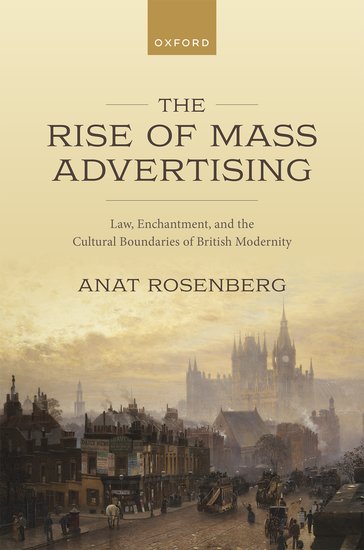
In 2022, Oxford University Press published an important new work by Professor Anat Rosenberg on the legal history of advertising in modern Britain. Rosenberg offers the first major cultural and legal history of the British advertising industry. Drawing on a wide array of interdisciplinary sources from various archives and libraries, Rosenberg explores official Home Office records, treatises, industry publications, fictional works, personal papers and much more. In Rosenberg’s skilled hands, these sources tell the story both of the rise of a mammoth cultural industry, but also of how this transformation felt to key players and the general public. Bringing together the histories of law, culture, and capitalism, Rosenberg’s book will be of interest to a wide audience. Therefore, we are pleased to bring you this forum on the book, featuring comments by four distinguished scholars, as well as a detailed response by Rosenberg.
–Gautham Rao, Editor-in-Chief, Law and History Review
Table of Contents
Roy Kreitner, “Enchanted Market Logic”
Abstract: This review of Anat Rosenberg’s The Rise of Mass Advertising expands on the implications of the book’s conceptual claims. The book focuses on the question of enchantment in advertising as threat to the image of consumer rationality; the review suggests that advertising’s enchantment is even more threatening when viewed structurally, at the normative level of justifying the market.
Roy Kreitner is Professor of Law, Tel Aviv University, Faculty of Law.
****
Erika Rappaport, “The Fantasy Life of Capitalism”
Abstract: This essay explores the significance of Anat Rosenberg’s new book for the study of Victorian culture and society, the history of advertising, and British imperialism and its critics.
Erica Rappaport is Professor of History at the University of California, Santa Barbara
****
Peter Mandler, “Enchanting Capitalism”
Abstract: Anat Rosenberg’s work in both Liberalizing Contracts and The Rise of Mass Advertising shows how the law can preserve some pre-, anti- or non-capitalist values in capitalist society. But it works differently in the case of the marriage contract and the consumer imagination, incorporating affect in the former case, but not seeking to police it in the latter.
Peter Mandler is Professor of Modern Cultural History at the University of Cambridge and Bailey Lecturer in History at Gonville and Caius College.
****
Rachel Bowlby, “Appreciating Advertisements”
Abstract: This article pursues some of the implications of Anat Rosenberg’s arguments about nineteenth-century advertising history as seen from a twenty-first-century perspective. Specifically, it looks at issues of long- and short-term value in relation to literature and advertising, and at the changing language of pregnancy.
Rachel Bowlby is Professor of Comparative Literature at University College London.
****
Anat Rosenberg, “Advertising, Non-rationalism, and the Legal Archives”
Abstract: This response addresses the central themes raised in the symposium, including questions of form and content in writing legal histories of popular culture; advertising and empire; liberal law and the persistence of the nonrational; and the theory and history of enchantment.
Anat Rosenberg is Senior Lecturer at the Harry Radzyner Law School, Reichman University, Israel.

